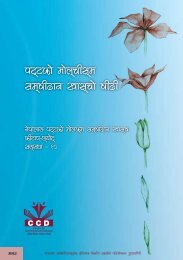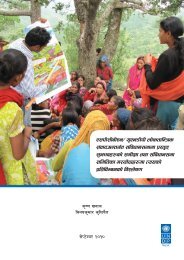The Dalits of Nepal and a New Constitution - ConstitutionNet
The Dalits of Nepal and a New Constitution - ConstitutionNet
The Dalits of Nepal and a New Constitution - ConstitutionNet
You also want an ePaper? Increase the reach of your titles
YUMPU automatically turns print PDFs into web optimized ePapers that Google loves.
26<br />
<strong>The</strong> <strong>Dalits</strong> <strong>of</strong> <strong>Nepal</strong> <strong>and</strong><br />
a <strong>New</strong> <strong>Constitution</strong><br />
including four towns <strong>and</strong> four villages. 28 Such practices<br />
include denial by “high castes” <strong>of</strong> entry by <strong>Dalits</strong> into<br />
houses, temples, hotels <strong>and</strong> restaurants, teashops, work<br />
places, food factories, dairy farms <strong>and</strong> milk collection<br />
centres etc. Non-<strong>Dalits</strong> deny <strong>Dalits</strong> services related to<br />
milk, health, credit, training, religion <strong>and</strong> food <strong>and</strong> drink.<br />
“High caste” people deny <strong>Dalits</strong> access to common<br />
resources including drinking water sources, community<br />
forests, <strong>and</strong> crematory. “High caste” people deny kinship<br />
<strong>and</strong> other relationships including inter-caste marriages;<br />
<strong>and</strong> <strong>Dalits</strong> experience caste based untouchability in feasts,<br />
festivals, marriage processions, <strong>and</strong> funerals.<br />
Dalit women start their day early in the morning by going<br />
to a nearby water source to fetch drinking water but they<br />
are not allowed to touch water fetched by “high caste”<br />
people, or they wait for their turn until “high caste” people<br />
have fetched water or even have to use a separate water<br />
source that is not used by “high caste” people. If <strong>Dalits</strong><br />
somehow touch water collected by “high caste” people,<br />
they are abused verbally or physically. “High caste” people<br />
do not enter their houses <strong>and</strong> <strong>Dalits</strong> are not allowed to<br />
enter “high caste” people’s houses. “High caste” <strong>and</strong> “low<br />
caste” people do not eat food together. It is ironic that<br />
“high caste” people hire <strong>Dalits</strong> as labourers or craftsmen<br />
when they build their houses but after its completion<br />
they perform purification rituals <strong>and</strong> then <strong>Dalits</strong> are not<br />
allowed to enter their houses. Marriage between non-<br />
<strong>Dalits</strong> <strong>and</strong> <strong>Dalits</strong> or between “high caste” <strong>and</strong> “low caste”<br />
<strong>Dalits</strong>, <strong>of</strong>ten ends up with separation or social boycott.<br />
Many <strong>Dalits</strong> work as agricultural labourers, cobblers,<br />
blacksmiths, tailors or musicians for their “high caste”<br />
patrons or l<strong>and</strong>lords but instead <strong>of</strong> wages or remuneration<br />
they get food grains during harvesting time. <strong>Dalits</strong> do not<br />
get rooms or houses to rent in towns unless they hide<br />
their Dalit identity. <strong>Dalits</strong> are not allowed to participate in<br />
politics in leadership positions.<br />
<strong>The</strong> concluding observations <strong>of</strong> the Committee on the<br />
Elimination <strong>of</strong> Racial Discrimination, in March 2004,<br />
include three important observations related to <strong>Dalits</strong>.<br />
“<strong>The</strong> Committee remains deeply concerned at the<br />
persistence <strong>of</strong> the de facto caste-based discrimination<br />
<strong>and</strong> the culture <strong>of</strong> impunity that apparently permeates<br />
the higher strata <strong>of</strong> a hierarchical social system. In<br />
particular, it is concerned at information on the existence<br />
<strong>of</strong> segregated residential areas for <strong>Dalits</strong>, social exclusion<br />
<strong>of</strong> inter-caste couples, restriction to certain types <strong>of</strong><br />
employment, <strong>and</strong> denial <strong>of</strong> access to public spaces, places<br />
<strong>of</strong> worship <strong>and</strong> public sources <strong>of</strong> food <strong>and</strong> water, as well<br />
as at allegations that public funds were used for the<br />
construction <strong>of</strong> separate water taps for <strong>Dalits</strong>.” 29 Another<br />
observation is about ineffective implementation <strong>of</strong> laws:<br />
“<strong>The</strong> Committee is concerned at the allegations <strong>of</strong> illtreatment<br />
<strong>and</strong> ineffective protection <strong>of</strong> <strong>and</strong> discrimination<br />
against <strong>Dalits</strong> <strong>and</strong> other vulnerable groups in society, by<br />
law enforcement <strong>of</strong>ficials, especially the police. <strong>The</strong><br />
Committee stresses that prompt <strong>and</strong> impartial<br />
investigations are paramount in counteracting<br />
discriminatory attitudes <strong>and</strong> practices.”<br />
Educational Hardships<br />
Dr. Bidhyanath Koirala, an expert on education <strong>and</strong> <strong>Dalits</strong>,<br />
categorized educational discrimination against <strong>Dalits</strong>: 30 (i)<br />
Direct discrimination which has resulted in higher dropout<br />
rates <strong>of</strong> Dalit students in education; (ii) Structural<br />
discrimination against Dalit students with no proper access<br />
to the means <strong>and</strong> materials in the schools; (iii) Silent<br />
discrimination by the School Management Committees<br />
who fail to take necessary action against school teachers,<br />
peers, management committee members <strong>and</strong> guardians<br />
who engage in caste-based discrimination in schools; (iv)<br />
Pedagogical discrimination including teachers’ use <strong>of</strong><br />
derogatory words <strong>and</strong> examples in regard to <strong>Dalits</strong>, <strong>and</strong><br />
failure to appreciate <strong>Dalits</strong>’ occupation, culture <strong>and</strong> skills.<br />
Poverty prevents Dalit children going to schools or<br />
continuing their education. Dalit children who do go to<br />
school are humiliated as untouchables by “high caste”<br />
teachers <strong>and</strong> students in school, especially in the class<br />
28<br />
Bhattachan, Krishna B. et al. Existing Practices <strong>of</strong> Caste-based Untouchability in <strong>Nepal</strong> <strong>and</strong> Strategy for a Campaign for Its Elimination, (Kathm<strong>and</strong>u: Actionaid, <strong>Nepal</strong>, 2003)<br />
page xiv.<br />
29<br />
Consideration <strong>of</strong> reports submitted by states parties under article 9 <strong>of</strong> the convention. Concluding observations <strong>of</strong> the Committee on the Elimination <strong>of</strong> Racial Discrimination.<br />
NEPAL. Committee on the Elimination <strong>of</strong> Racial Discrimination, Sixty-fourth session 23 February-12 March, 2004. CERD/C/64/CO/5, 28 April 2004, para. 12. Available<br />
on the internat http://www1.umn.edu/humanrts/country/nepal2004.html.<br />
30<br />
Cited by Bhattachan, Krishna B., Tej Sunar <strong>and</strong> Yasso Kanti Bhattachan (Gauchan). Caste based Discrimination in <strong>Nepal</strong> (2007) (A final draft report prepared for Indian Institute<br />
<strong>of</strong> Dalit Studies (IIDS), Delhi, International Dalit Solidarity Network (IDSN), Copenhagen, in association with <strong>Nepal</strong> National Dalit Social Welfare Organization (NNDSWO) <strong>and</strong> Dalit<br />
NGO Federation (DNF)).


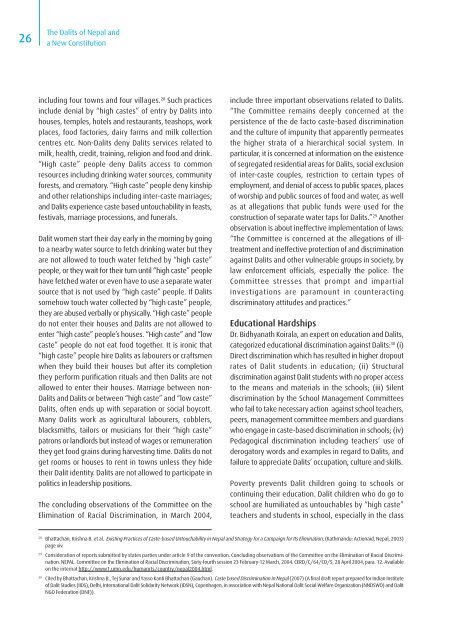

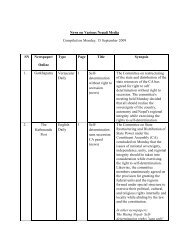

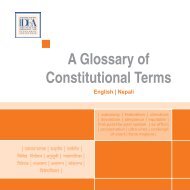
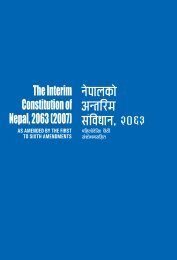
![g]k fnsf blntx? / gofF ;+l jwfg](https://img.yumpu.com/49483602/1/184x260/gk-fnsf-blntx-goff-l-jwfg.jpg?quality=85)
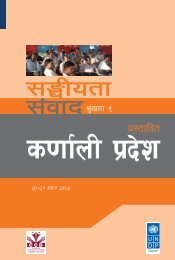

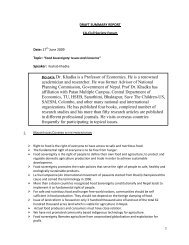
![+ljwfg;ef, /fHosf]k'g](https://img.yumpu.com/41604075/1/184x260/-ljwfgef-fhosfkg.jpg?quality=85)
